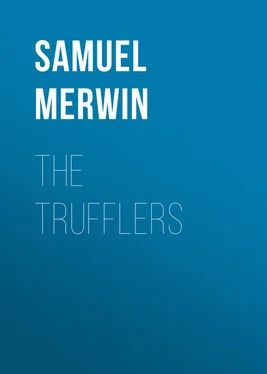Samuel Merwin - The Trufflers
Здесь есть возможность читать онлайн «Samuel Merwin - The Trufflers» — ознакомительный отрывок электронной книги совершенно бесплатно, а после прочтения отрывка купить полную версию. В некоторых случаях можно слушать аудио, скачать через торрент в формате fb2 и присутствует краткое содержание. ISBN: , Жанр: foreign_prose, на английском языке. Описание произведения, (предисловие) а так же отзывы посетителей доступны на портале библиотеки ЛибКат.
- Название:The Trufflers
- Автор:
- Жанр:
- Год:неизвестен
- ISBN:http://www.gutenberg.org/ebooks/51985
- Рейтинг книги:4 / 5. Голосов: 1
-
Избранное:Добавить в избранное
- Отзывы:
-
Ваша оценка:
- 80
- 1
- 2
- 3
- 4
- 5
The Trufflers: краткое содержание, описание и аннотация
Предлагаем к чтению аннотацию, описание, краткое содержание или предисловие (зависит от того, что написал сам автор книги «The Trufflers»). Если вы не нашли необходимую информацию о книге — напишите в комментариях, мы постараемся отыскать её.
The Trufflers — читать онлайн ознакомительный отрывок
Ниже представлен текст книги, разбитый по страницам. Система сохранения места последней прочитанной страницы, позволяет с удобством читать онлайн бесплатно книгу «The Trufflers», без необходимости каждый раз заново искать на чём Вы остановились. Поставьте закладку, и сможете в любой момент перейти на страницу, на которой закончили чтение.
Интервал:
Закладка:
Samuel Merwin
The Trufflers / A Story
CHAPTER I – THE GIRL IN THE PLAID COAT
PETER ERICSON MANN leaned back in his chair and let his hands fall listlessly from the typewriter to his lap.
He raised them again and laboriously pecked out a few words.
It was no use.
He got up, walked to one of the front windows of the dingy old studio and peered gloomily out at the bare trees and brown grass patches of Washington Square.
Peter was a playwright of three early (and partial) successes, and two more recent failures. He was thirty-three years old; and a typical New Yorker, born in Iowa, he dressed conspicuously, well, making it a principle when in funds to stock up against lean seasons to come. He worried a good deal and kept his savings of nearly six thousand dollars (to the existence of which sum he never by any chance alluded) in five different savings banks. He wore large horn-rimmed eyeglasses (not spectacles) with a heavy black ribbon attached, and took his Art almost as seriously as himself. You know him publicly as Eric Mann.
For six months Peter had been writing words where ideas were imperatively demanded. Lately he had torn up the last of these words. He had waited in vain for the divine uprush; there had come no tingle of delighted nerves, no humming vitality, no punch. And as for his big scene, in Act III, it was a morass of sodden, tangled, dramatic concepts.
His theme this year was the modern bachelor girl; but to save his life he couldn’t present her convincingly as a character in a play – perhaps because these advanced, outspoken young women irritated him too deeply to permit of close observation. Really, they frightened him. He believed in marriage, the old-fashioned woman, the home.
It had reached the point, a month back, where he could no longer even react to stimulants. He had revived an old affair with a pretty manicure girl without stirring so much as a flutter of excitement within himself. This was Maria Tonifetti, of the sanitary barber shop of Marius in the basement of the Parisian Restaurant. He had tried getting drunk; which made him ill and induced new depths of melancholy.
No one ever saw his name any more. No one, he felt certain, ever would see it. He could look back now on the few years of his success in a spirit of awful calm. He felt that he had had genius. But the genius had burned out. All that remained to him was to live for a year or two (or three) watching that total of nearly six thousand dollars shrink – shrink – and then the end of everything. Well, he would not be the first…
One faint faded joy had lately been left to Peter, one sorry reminder of the days when the magical words, the strangely hypnotic words, “Eric Mann,” had spoken, sung, shouted from half the bill-boards in town. Over beyond Sixth Avenue, hardly five minutes’ walk through the odd tangle of wandering streets, the tenements and ancient landmarks and subway excavations and little triangular breathing places that make up the Greenwich Village of to-day, there had lingered one faded, torn twenty-four-sheet poster, advertising “The Buzzard, by Eric Mann.”
When he was bluest lately, Peter had occasionally walked over there and stood for a while gazing at this lingering vestige of his name.
He went over there now, in soft hat and light overcoat, and carrying his heavy cane – hurried over there, in fact – across the Square and on under the Sixth Avenue elevated into that quaint section of the great city which socialists, anarchists, feminists, Freudian psycho-analysts of self, magazine writers, Jewish intellectuals, sculptors and painters of all nationalities and grades, sex hygiene enthusiasts, theatrical press-agents and various sorts of youthful experimenters in living share with the merely poor.
He stopped at a familiar spot on the curb by a familiar battered lamp-post and peered across the street.
Then he started – and stared. Surprise ran into bewilderment, bewilderment into utter dejection.
The faded, torn twenty-four-sheet poster had vanished.
A new brand of cut plug tobacco was advertised there now.
Ragged children of the merely poor, cluttering pavement and sidewalk, fell against him in their play. Irritably he brushed them aside.
It was indeed the end.
A young woman was crossing the street toward him, nimbly dodging behind a push cart and in front of a coal truck. Deep in self, he lowered his gaze and watched her. So intent was his stare that the girl stopped short, one foot on the curb, slowly lowered the apple she was eating, and looked straight at him.
She was shaped like a boy, he decided – good shoulders, no hips, fine hands (she wore no gloves, though the March air was crisp) and trim feet in small, fiat-heeled tan boots. Her hair, he thought, was cut short. He was not certain, for her “artistic” tarn o’shanter covered it and hung low on her neck behind. He moved a step to one side and looked more closely. Yes, it was short. Not docked, in the current fashion, but cut close to her head, like a boy’s.
She stepped up on the curb now and confronted him. He noted that her suit was of brown stuff, loosely and comfortably cut; and that the boyish outer coat, which she wore swinging open, was of a rough plaid. Then he became aware of her eyes. They were deep green and vivid. Her skin was a clear olive, prettily tinted by air and exercise… Peter suddenly knew that he was turning red.
She spoke first.
“Hadn’t we better say something?” was her remark. Then she took another bite of the apple, and munched it with honest relish.
“Very likely we would better,” he managed to reply – rather severely, for the “had better” phrase always annoyed him.
“It seems as if I must have met you somewhere,” he ventured next.
“No, we haven’t met.”
“My name is Mann.”
“Yes,” said she, “I know it.”
“Then suppose you tell me yours?”
“Why?”
Peter could not think of a reason why. Deeply as he was supposed to understand women, here was a new variety. She was inclined neither to flirt nor to run away.
“How is it that you know who I am?” he asked, sparring for time..
She gave a careless shrug. “Oh, most every one is known, here in the Village.”
Peter was always at his best when recognized as the Eric Mann. His spirits rose a bit.
“Might I suggest that we have a cup of tea somewhere?”
She knit her brows. “Yes,” she replied slowly, even doubtfully, “you might.”
“Of course, if you – ”
“Jim’s isn’t far. Let’s go there.”
Jim’s was an oyster and chop emporium of ancient fame in the Village. They sat at a rear table. The place was empty save for an old waiter who shuffled through the sprinkling of sawdust on the floor, and a fat grandson of the original Jim who stood by the open grill that was set in the wall at the rear end of the oyster bar.
Over the tea Peter said, expanding now – “Perhaps this is reason enough for you to tell me who you are.”
“Perhaps what is?”
He smilingly passed the toast.
She took a slice, and considered it.
“You see,” he went on, “if I am not to know, how on earth am I to manage seeing you again?”
She slowly inclined her head. “That’s just it.”
It was Peter’s turn to knit his brow’s.
“How can I be sure that I want you to see me again?”
He waved an exasperated hand. “Then why are we here?”
“To find out.”
At least he could smoke. He opened his cigarette case. Then, though he never felt right about women smoking, he extended it toward her.
“Thanks,” said she, taking one and casually lighting it. Yes, she had fine hands. And he had noted when she took off her coat and reached up to hang it on the wall rack, her youth-like suppleness of body. A provocative person!
Читать дальшеИнтервал:
Закладка:
Похожие книги на «The Trufflers»
Представляем Вашему вниманию похожие книги на «The Trufflers» списком для выбора. Мы отобрали схожую по названию и смыслу литературу в надежде предоставить читателям больше вариантов отыскать новые, интересные, ещё непрочитанные произведения.
Обсуждение, отзывы о книге «The Trufflers» и просто собственные мнения читателей. Оставьте ваши комментарии, напишите, что Вы думаете о произведении, его смысле или главных героях. Укажите что конкретно понравилось, а что нет, и почему Вы так считаете.












